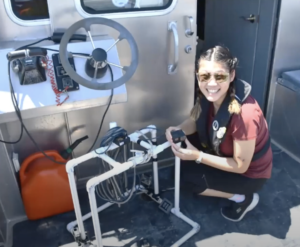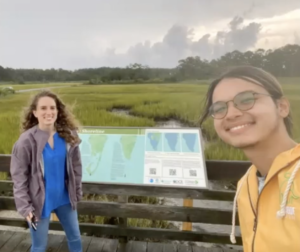A Framework for Growth in Internships
Randy K. Rowel, Director of the Chesapeake Student Recruitment, Early Advisement, and Mentoring (C-StREAM) program at the Chesapeake Research Consortium, moderated the webinar featuring two students who just completed a summer research experience with the C-StREAM program. Anna He, Duke University student and NOAA intern, and Joseph Rivera Lopez, University of Puerto Rico student and VIMS intern, discussed their summer research and the competencies that they developed during their time in the program.
Takeaways from the webinar
Anna He (Duke University) focused on oyster reef assessment during her research experience with the NOAA Chesapeake Bay Office. Her mentor is Jay Lazar. She is currently a senior majoring in Environmental Science with an interest in coastal resilience, restoration, GIS, and public health.
- Oyster restoration began in Harris Creek in 2012; ten years after the initial restoration efforts, Anna used a Rapid Assessment Protocol (RAP) to assess habitat quality. RAP involves using GoPro cameras to take videos of underwater reefs and scoring the images based on oyster shell coverage and height. Overall habitat quality in Harris Creek was good with reef sites restored using stone having the most complex, highest coverage reefs.
- This study was also tasked with assessing the practicality of the rapid assessment approach. RAP was found to be an efficient method for a quick, categorical assessment of reef quality with about 20 sites visited per hour in the field, but is not a replacement for traditional monitoring methods.
- Anna honed her systems thinking, civic responsibility, and professional development competencies with the help of her colleagues and mentor.
Joseph Rivera Lopez (University of Puerto Rico) worked in coastal resilience and community outreach with the Center for Coastal Resources Management at the Virginia Institute of Marine Science (VIMS). His mentor is Molly Mitchell. He is currently an Environmental Science major with an interest in marine science research and outreach.
- Joseph participated in listening sessions utilizing breakout groups around the topic of climate resiliency in rural areas. The breakout groups conveyed that climate communication was the biggest challenge – both unease in speaking about the topic and encountering aggressive pushback.
- Rural communities are especially vulnerable to climate impacts because they often lack funding and resources for mitigation projects. Therefore, it is important to make tools and models for decision-making as available and easy to use as possible. Joseph worked on the Chesapeake Bay Climate Adaptation Toolbox, or CBCAT, which catalogs existing tools.
- Joseph expanded his competency for global and local diversity and inclusion.
Resources for further action
C-StREAM website: https://chesapeake.org/c-stream/
2022 Symposium website: https://chesapeake.org/c-stream-symposium-2022/


